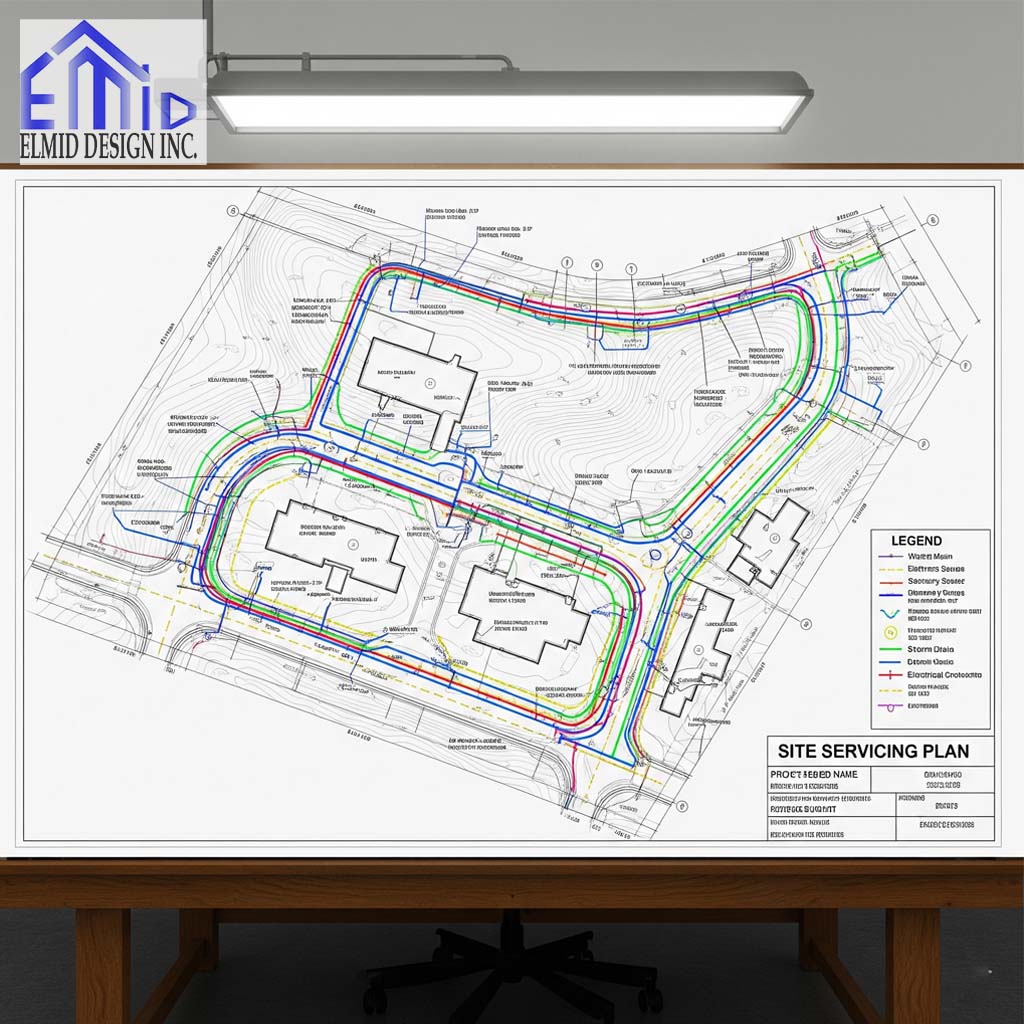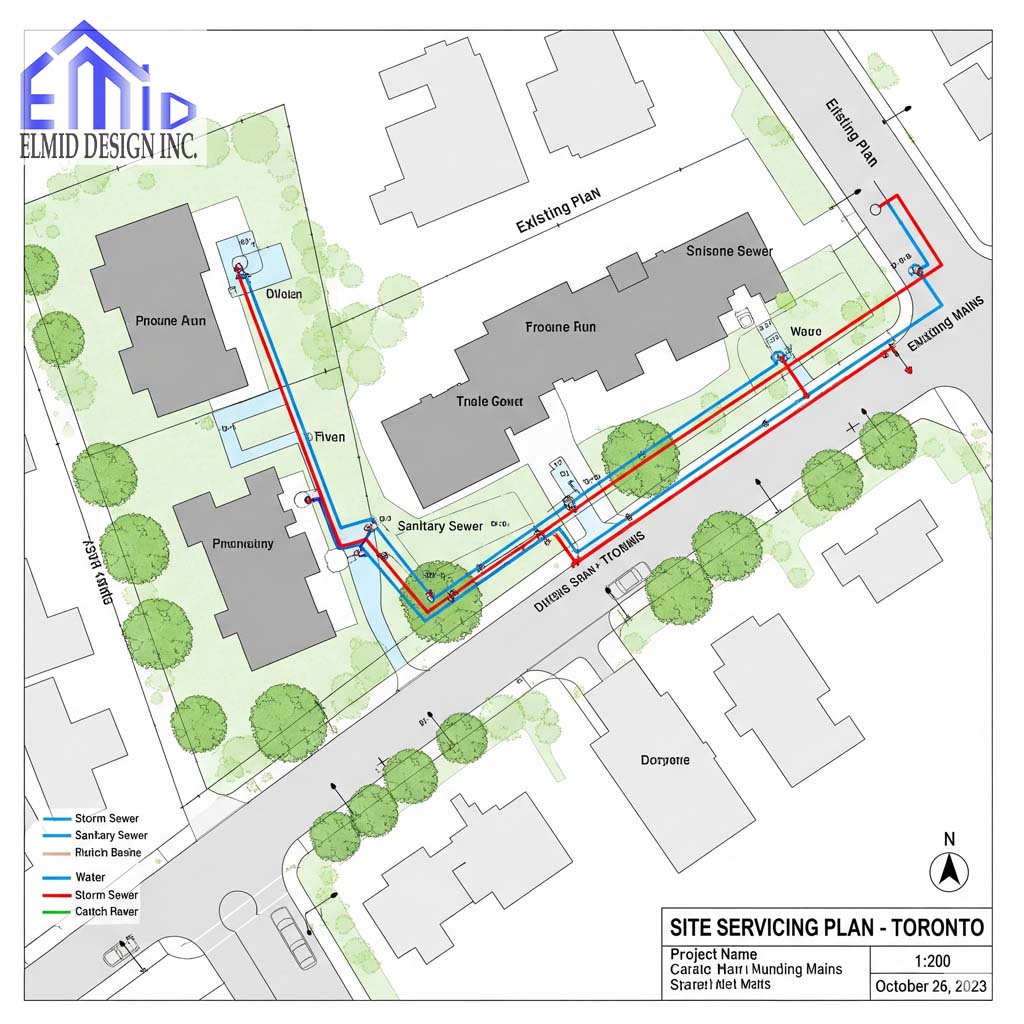A site servicing plan in Toronto is one of the most important requirements for any new building project. It shows how a property will be connected to essential infrastructure like water, sanitary sewers, stormwater systems, and road access. Without this plan, no building permit or development approval can move forward. Developers, contractors, and property owners in Toronto need to understand what a site servicing plan is, why it matters, and how it affects the success of a construction project.
Key Takeaways
A site servicing plan is mandatory for most building projects in Toronto.
It covers water, sewer, drainage, grading, and utility connections.
Toronto has strict engineering standards and stormwater guidelines.
Approval requires submission to City departments and sometimes outside agencies.
Working with licensed engineers such as Elmid Design Inc, authorized by PEO, ensures compliance and approval.
What Is a Site Servicing Plan Toronto
A site servicing plan Toronto is a detailed engineering drawing and report that shows how a new building will be serviced by municipal infrastructure. It includes water connections for domestic use and fire protection, sanitary sewer links for waste, stormwater drainage systems to control runoff, and grading plans to manage surface flow. The plan also coordinates road access and utility connections. This document ensures that the property functions properly and does not negatively affect neighboring lands.
Why a Site Servicing Plan Is Required for Building Projects
Toronto requires a site servicing plan because every new development must connect to existing municipal infrastructure safely and efficiently. The City needs proof that water supply, sewers, and drainage systems can support the proposed building. It prevents flooding, protects natural systems, and ensures proper lot grading. For large buildings, stormwater must be managed to meet wet weather flow standards. Without this approval, construction cannot begin, even if architectural designs are complete.
The Role of Toronto Regulations in Site Servicing Plans
Toronto operates under provincial and municipal regulations that control site servicing plans. Ontario’s Planning Act and Building Code require developments to show safe servicing. Locally, the City enforces engineering design standards, sewer and watermain guidelines, and stormwater management requirements. Every plan must comply with these rules before receiving a building permit. City engineers review each submission to confirm it meets design criteria and capacity limits. Developers who ignore these requirements face delays, redesigns, and potential rejection.
Components of a Site Servicing Plan Toronto
A complete site servicing plan Toronto includes several coordinated systems. Water connections show how the building links to the municipal supply, including hydrant coverage for fire safety. Sanitary sewer layouts detail pipe locations, slopes, and manholes to carry waste to the municipal network. Stormwater design demonstrates how surface runoff will be collected, treated, and released at safe rates. Grading plans indicate slopes, retaining walls, and lot elevations that prevent flooding. Road access and driveways must meet transportation standards, while utility corridors show how power, gas, and telecom lines reach the site.
Building Permits and Site Servicing Approval
When applying for a building permit in Toronto, applicants must submit a site servicing plan along with architectural drawings and structural details. The City will not issue permits until the engineering team confirms servicing capacity and design compliance. Depending on the project size, applicants must also secure additional permits such as plumbing and drain approvals. This process allows construction to move forward only after the engineering team resolves all servicing issues. For builders, this means working closely with engineers early in the design stage to avoid costly delays.
The Process of Preparing a Site Servicing Plan
The process begins with a survey of the property to map topography, existing connections, and elevations. Engineers then design the servicing systems in accordance with Toronto’s standards. They create stormwater models to show water balance and quality control. The engineering team submits draft drawings and reports to the City for review. After receiving feedback, the engineers revise the documents until the City issues final approval. Once the City grants approval, the servicing plan becomes part of the legal site plan agreement, and construction moves forward under inspection.
Stormwater Management in Site Servicing Plans
Toronto places strong emphasis on stormwater management in building projects. The City’s wet weather flow guidelines require developments to capture, filter, and slowly release runoff into municipal systems. Engineers must design features such as catch basins, storm sewers, infiltration galleries, or green roofs to achieve these goals. Without an approved stormwater strategy, the servicing plan will not pass review. This protects both local infrastructure and the natural environment from flooding, erosion, and pollution.
Grading and Drainage in Toronto Site Servicing Plans
Proper grading ensures that water flows away from buildings and does not create ponding on site or flooding on neighboring properties. Toronto has strict lot grading standards that dictate minimum slopes, swales, and drainage patterns. These must be shown on the servicing plan with precise spot elevations. Incorrect grading is one of the most common reasons for plan rejection, as it can lead to water damage and liability issues. A licensed engineer must certify that grading meets City requirements.
The Role of Professional Engineers in Site Servicing Plans
Site servicing plans must be prepared and sealed by licensed professional engineers. In Toronto, firms like Elmid Design Inc, which hold a certificate of authorization from Professional Engineers Ontario, provide this service. Their expertise ensures that the design complies with municipal standards and withstands technical review. Using unlicensed or unqualified designers can result in immediate rejection by the City. Professional engineers also act as trusted advisors for clients, guiding them through the complex approval process.
Site Servicing Plan Toronto for Residential Developments
Residential projects such as custom homes, townhouses, or subdivisions all require site servicing plans. Even small developments must show water, sanitary, and drainage connections. In subdivisions, servicing plans become larger and more complex, involving multiple lots and shared infrastructure. Approval is tied closely to lot grading plans, which dictate how each property will drain safely. Homeowners and builders who ignore these steps risk costly delays and municipal enforcement orders.

Site Servicing Plan Toronto for Commercial Buildings
Commercial developments require larger and more complex site servicing plans. A single office building or retail plaza often demands higher water capacity, larger sanitary lines, and advanced stormwater systems. These projects also require coordination with fire flow demands, truck access, and expanded utility connections. Toronto reviews these plans carefully to ensure they meet both functional needs and community safety standards. Developers who work with professional engineers at the start of planning avoid costly redesigns later in the approval process.
Site Servicing Plan Toronto for Industrial Projects
Industrial buildings place unique demands on site servicing. Facilities may need heavy water use, specialized fire protection, and reinforced sanitary systems to handle industrial waste. Stormwater treatment becomes critical when outdoor storage or large paved areas are involved. The City requires clear proof that these systems will protect municipal infrastructure and the environment. Preparing an accurate industrial servicing plan in Toronto involves careful coordination with environmental standards, safety codes, and capacity studies conducted by qualified engineers.
Approval Process for Site Servicing Plans in Toronto
The approval process begins when engineers prepare preliminary servicing layouts based on surveys and municipal records. After drafting the design, the engineering team submits it to City staff for technical review. City staff provide comments that require adjustments to drainage, grading, or utility placement. Engineers revise the documents and resubmit them until the City issues final approval. Only after City engineers confirm compliance with all standards can the building permit move forward. Early consultation with the City helps reduce delays and rejections.
Common Challenges in Site Servicing Plans Toronto
One of the biggest challenges is dealing with limited municipal infrastructure capacity. Existing sewers and watermains may not have the ability to support new development without upgrades. Another challenge involves stormwater management, where strict standards often require innovative solutions. Grading disputes also arise when water flow could impact neighboring properties. Developers must also balance servicing requirements with architectural and landscaping goals. Engaging licensed engineers like Elmid Design Inc helps resolve these issues by ensuring designs meet both technical and practical needs.
Costs Associated with a Site Servicing Plan Toronto
The cost of preparing a site servicing plan varies depending on project size and complexity. A small residential infill may require a straightforward design, while a large commercial or industrial development demands extensive modeling and multiple engineering disciplines. Beyond consulting fees, developers must also budget for application fees, potential upgrades to municipal infrastructure, and securities required by the City. While upfront costs can be significant, investing in a well-prepared plan prevents far greater expenses from delays, redesigns, or construction failures.
Timelines for Site Servicing Plan Approval in Toronto
Approval timelines depend on project complexity, submission quality, and City workload. Simple residential projects may take a few weeks, while large developments often require months of review and revision. Toronto’s detailed review process ensures compliance with safety, environmental, and infrastructure standards, but it can be time-consuming. Developers who work with experienced engineers often secure faster approvals because the initial submission is more complete. Planning ahead and submitting early in the project schedule reduces the risk of costly construction delays.
Role of Coordination in Site Servicing Plans
Site servicing plans do not exist in isolation. They must coordinate with architectural designs, landscaping plans, transportation studies, and environmental reports. A servicing plan that conflicts with building layouts or driveway access will be rejected. Coordination between consultants is essential to align all design elements. Professional engineers take the lead in this process, ensuring that servicing integrates seamlessly with every part of the project. Without this coordination, the risk of design clashes and costly revisions increases significantly.
Site Servicing Plan Toronto and Environmental Protection
Toronto enforces strict guidelines to protect natural systems from development impacts. Servicing plans must address runoff quality, erosion control, and groundwater recharge. Stormwater must be treated to reduce pollutants before entering municipal systems. Industrial projects may also require specialized containment systems to prevent contamination. By following these standards, developments protect local rivers, lakes, and wetlands. Engineering firms with expertise in environmental design ensure that servicing plans not only meet City approval but also contribute to long-term sustainability.
Importance of Professional Expertise in Site Servicing Plans
The complexity of site servicing plans means that only licensed professional engineers should prepare them. Firms like Elmid Design Inc, which hold authorization from Professional Engineers Ontario, provide both technical accuracy and regulatory compliance. Their involvement demonstrates to the City that the plan is credible and reliable. This expertise improves the chances of quick approval while protecting the developer’s investment. Without professional guidance, projects risk delays, legal disputes, and failures in construction or operation.
Future Trends in Site Servicing Plan Toronto
As Toronto grows, site servicing plans will continue to evolve with technology and sustainability goals. More developments are adopting green infrastructure, permeable pavements, and advanced stormwater management systems. Digital modeling and 3D coordination are also becoming standard in engineering design. The City is expected to strengthen requirements around climate resilience and flood protection. Developers who adapt to these trends and work with innovative engineering firms will be better prepared for future regulations and market expectations.
Case Studies of Site Servicing Plan Toronto
A mixed-use development in downtown Toronto required a comprehensive site servicing plan that balanced commercial needs with residential demands. Engineers designed a system that included high-capacity water connections, stormwater storage tanks, and advanced grading solutions. Approval took several months due to coordination with transportation and utility departments. Another case involved a subdivision in North York where lot grading created challenges. The engineering team adjusted the elevations to prevent runoff into existing neighborhoods. Both projects highlight the importance of flexibility and technical expertise when preparing servicing plans in Toronto.
Step by Step Approval Workflow for Site Servicing Plans
The approval workflow begins with a pre-consultation meeting with the City to review servicing expectations. After this stage, engineers prepare preliminary designs based on surveys and available municipal data. A full submission is then delivered to City staff for technical review. Comments usually require revisions before resubmission. Once the City confirms compliance, a formal servicing agreement may be required. Only after this step can the developer move forward with securing building permits. This structured process ensures safety, capacity, and long-term functionality.
Legal Considerations in Site Servicing Plan Toronto
Legal agreements play an important role in the approval process. For larger projects, developers may be required to enter into servicing agreements with the City. These agreements outline responsibilities for construction, inspection, and potential infrastructure upgrades. Financial securities are often collected to guarantee compliance and completion of work. Without meeting these obligations, construction cannot proceed legally. Working with licensed engineers and experienced consultants ensures that legal documents align with technical drawings, reducing the risk of disputes during or after construction.
Advanced Stormwater Strategies in Toronto Site Servicing Plans
Toronto has moved beyond basic stormwater management by encouraging advanced strategies that improve sustainability. Many servicing plans now include infiltration systems, rain gardens, permeable pavements, and underground storage tanks. These systems reduce peak flows and improve water quality before discharge. Engineers must also consider climate change impacts, designing systems that withstand more frequent and intense storms. By adopting advanced stormwater strategies, developers not only meet City standards but also create resilient sites that add long-term value to the community and environment.
Integration of Site Servicing Plans with Building Design
A servicing plan is effective only when it aligns with the overall building design. Driveways, parking areas, loading zones, and landscaping must all coordinate with grading and servicing layouts. Conflicts between building layouts and utility corridors often delay approvals. Collaboration between architects, planners, and engineers during the early design phase prevents these issues. In Toronto, successful projects always integrate servicing considerations with architectural and structural designs. This integration reduces redesigns and ensures construction proceeds smoothly once permits are issued.
Inspections and Compliance During Construction
Once a site servicing plan receives approval, compliance continues throughout construction. City inspectors verify that installation matches the approved design. This includes checking water connections, sanitary sewer slopes, stormwater systems, and grading elevations. Deviations without approval may result in stop-work orders or costly reconstruction. Developers must maintain communication with both contractors and engineers to ensure accurate execution. Final acceptance only occurs once the City is satisfied that servicing meets design and safety standards. Proper oversight protects both the builder and the municipality.
Long Term Maintenance of Site Servicing Systems
A site servicing plan does not end with construction. Long term maintenance ensures that systems continue to perform as designed. Stormwater features such as catch basins and storage tanks require regular inspection and cleaning. Grading must be monitored to prevent settlement that alters drainage patterns. Sanitary and water connections also need ongoing monitoring to ensure reliability. In Toronto, failure to maintain servicing systems can result in municipal orders or costly repairs. Professional oversight helps property owners protect their investment for decades.
The Importance of Choosing the Right Engineering Firm
Selecting the right engineering partner is one of the most important steps in preparing a site servicing plan in Toronto. Firms like Elmid Design Inc, authorized by Professional Engineers Ontario, provide expertise, credibility, and trust. Their knowledge of municipal standards and approval processes reduces delays and increases approval success. The City recognizes plans sealed by licensed professionals as reliable and enforceable. Developers who work with experienced firms gain not only technical accuracy but also strategic guidance throughout the entire building process.
Site Servicing Plan Toronto and Urban Growth
As Toronto continues to expand, site servicing plans play a critical role in shaping sustainable urban growth. Every new building must integrate with existing infrastructure while protecting the environment and supporting community needs. Proper servicing ensures that developments do not strain water supply, overload sewers, or cause flooding. It also supports long term resilience as the city grows. By enforcing strict servicing standards, Toronto balances development opportunities with responsible infrastructure planning and environmental protection.
Final Thoughts on Site Servicing Plan Toronto
A site servicing plan Toronto is not just a technical requirement but a foundation for safe and sustainable building. From residential homes to large industrial complexes, every project depends on accurate servicing to connect with municipal infrastructure. The approval process may be complex, but with professional guidance, it becomes manageable. Developers who invest in quality servicing plans reduce risks, avoid delays, and protect long term property value. In Toronto’s competitive building environment, success begins with proper servicing design and execution.
Frequently Asked Questions
Do all building projects in Toronto need a site servicing plan
Most developments, including residential, commercial, and industrial projects, require a site servicing plan. Exemptions are rare and usually limited to very small renovations.
How long does it take to get approval for a site servicing plan Toronto
Timelines vary, but small projects may be approved in weeks while larger developments can take several months due to technical review and revisions.
Who can prepare a site servicing plan Toronto
Only licensed professional engineers with authorization from Professional Engineers Ontario can prepare and seal a servicing plan for submission.
What happens if my site servicing plan is rejected by the City
The City will provide comments that must be addressed. Revised drawings are then resubmitted for further review until compliance is achieved.
How much does a site servicing plan Toronto cost
Costs vary widely depending on project scale and complexity. Small projects may be affordable, but large developments require significant investment in engineering services.

Elmid Design Inc: Trusted Experts in Site Servicing Plans Toronto
Elmid Design Inc is a Toronto-based engineering firm with a certificate of authorization from Professional Engineers Ontario. The company specializes in preparing site servicing plans that meet municipal standards and secure fast approvals for residential, commercial, and industrial projects. With deep knowledge of local regulations, stormwater management, and grading requirements, Elmid Design Inc delivers reliable designs that protect client investments. Developers and property owners trust the firm’s expertise, professionalism, and commitment to quality, making it a leading choice for site servicing plan Toronto projects.
Geographic Locations That We Service:
Our Licensed Professional Engineers specializing in Engineered Site Grading Plans offer the best-engineered site grading plan, lot grading and erosion plan, and drainage plan to obtain site plan approval and building permits in Ontario, including a wide range of municipalities. Each area boasts unique features and requirements, making our tailored approach essential for success.
Toronto and Surrounding Areas
In the vibrant heart of Ontario, we service Toronto (City of Toronto) and surrounding areas. Additionally, we cover Oshawa (City of Oshawa), Pickering (City of Pickering), and Clarington (Municipality of Clarington). Furthermore, our expertise extends to Ajax (Town of Ajax), Whitby (Town of Whitby), Brock (Township of Brock), Scugog (Township of Scugog), and Uxbridge (Township of Uxbridge).
Halton Region
Moving to the Halton Region, our services encompass Burlington (City of Burlington) and Halton Hills (Town of Halton Hills). Also included are Milton (Town of Milton) and Oakville (Town of Oakville).
Peel Region
In the Peel Region, we provide services in Brampton (City of Brampton), Mississauga (City of Mississauga), and Caledon (Town of Caledon).
York Region
Our services in the York Region cover Vaughan (City of Vaughan), Aurora (Town of Aurora), and East Gwillimbury (Town of East Gwillimbury). We also cater to Georgina (Town of Georgina), Markham (City of Markham), Newmarket (Town of Newmarket), Richmond Hill (City of Richmond Hill), Whitchurch-Stouffville (Town of Whitchurch-Stouffville), King (Township of King), and Bradford-West Gwillimbury (Town of Bradford-West Gwillimbury). Each municipality here offers a distinct setting, requiring our specialized approach.
Other Southern Ontario Cities and Towns
We also serve many other cities and towns in Southern Ontario. These include Hamilton (City of Hamilton), St. Catharines (City of St. Catharines), Niagara on the Lake (Town of Niagara on the Lake), Brant (County of Brant), Cambridge (City of Cambridge), Kitchener (City of Kitchener), Waterloo (City of Waterloo), and Woodstock (City of Woodstock). Furthermore, we operate in Guelph (City of Guelph), Centre Wellington (Township of Centre Wellington), Shelburne (Town of Shelburne), Orangeville (Town of Orangeville), New Tecumseth (Town of New Tecumseth), Essa (Town of Essa), Collingwood (Town of Collingwood), Wasaga Beach (Town of Wasaga Beach), Barrie (City of Barrie), Midland (Town of Midland), Orillia (City of Orillia), Ramara (Town of Ramara), Minden Hills (Town of Minden Hills), North Kawartha (Town of North Kawartha), Kawartha Lakes (City of Kawartha Lakes), Peterborough (City of Peterborough), Selwyn (Town of Selwyn), and Brighton (Municipality of Brighton).




